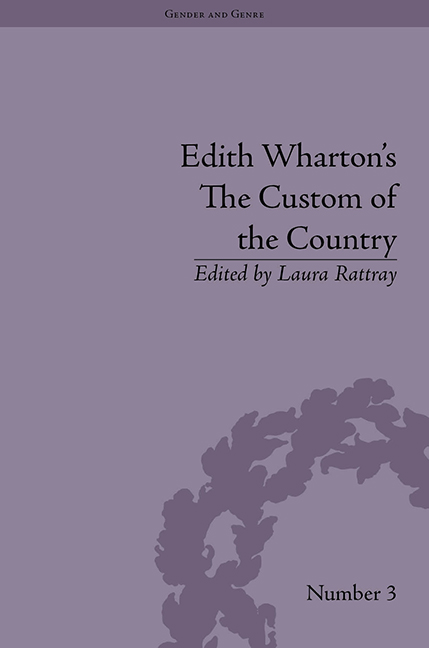Book contents
- Frontmatter
- CONTENTS
- Acknowledgements
- Editorial Note
- List of Contributors
- List of Figures
- Introduction
- 1 The Custom of the Country: Edith Wharton's Conversation with the Atlantic Monthly
- 2 When the Reading Had to Stop: Readers, Reading and the Circulation of Texts in The Custom of the Country
- 3 ‘Don't Cry – it ain't that Kind of a Story’: Wharton's Business of Fiction, 1908–12
- 4 Worst Parents Ever: Cultures of Childhood in The Custom of the Country
- 5 Crude Ascending the Staircase: Undine Spragg and the Armory Show
- 6 ‘It's Better to Watch’: Compulsive Voyeurism in The Custom of the Country and The House of Mirth
- 7 A ‘Mist of Opopanax’: Mapping the Scentscape of The Custom of the Country
- 8 Landscape with the Fall of Undine
- 9 Girls from the Provinces: Wharton's Undine Spragg and Cather's Thea Kronborg
- 10 Men at Work in The Custom of the Country
- 11 ‘Lost in Translation’: Financial Plots and the Modernist Reader in The Custom of the Country
- Notes
- Index
1 - The Custom of the Country: Edith Wharton's Conversation with the Atlantic Monthly
- Frontmatter
- CONTENTS
- Acknowledgements
- Editorial Note
- List of Contributors
- List of Figures
- Introduction
- 1 The Custom of the Country: Edith Wharton's Conversation with the Atlantic Monthly
- 2 When the Reading Had to Stop: Readers, Reading and the Circulation of Texts in The Custom of the Country
- 3 ‘Don't Cry – it ain't that Kind of a Story’: Wharton's Business of Fiction, 1908–12
- 4 Worst Parents Ever: Cultures of Childhood in The Custom of the Country
- 5 Crude Ascending the Staircase: Undine Spragg and the Armory Show
- 6 ‘It's Better to Watch’: Compulsive Voyeurism in The Custom of the Country and The House of Mirth
- 7 A ‘Mist of Opopanax’: Mapping the Scentscape of The Custom of the Country
- 8 Landscape with the Fall of Undine
- 9 Girls from the Provinces: Wharton's Undine Spragg and Cather's Thea Kronborg
- 10 Men at Work in The Custom of the Country
- 11 ‘Lost in Translation’: Financial Plots and the Modernist Reader in The Custom of the Country
- Notes
- Index
Summary
In 1907, the Atlantic Monthly celebrated its fiftieth anniversary with an issue devoted to assuring its own place in literary history. Appreciations of Henry Wadsworth Longfellow, John Greenleaf Whittier and its first editor, James Russell Lowell, recalled the glory days when an unknown editor named Francis Underwood began soliciting contributors for a Boston-based magazine that would be both literary and anti-slavery. It only remained for Oliver Wendell Holmes to name it.
Although Philadelphia boasted Graham's, Godey's and Sartain's and New York Putnam's, Harper's New Monthly and the old Knickerbocker, Boston had no strictly ‘literary’ magazine of its own. The closest it came was the North American Review, modelled after the British quarterlies and catering to a highly literate audience. With most popular magazines of the day providing, in the words of one of the Atlantic's founders, ‘thrice-diluted trash, in the shape of namby-pamby love tales and sketches’, Underwood and his cohorts saw an untapped market in the middle class and middle brow. No one could fully realize what the Atlantic would mean to culture-starved householders in small western towns like its third editor, William Dean Howells, or for that matter to the girl who would become Edith Wharton.
The year of the Atlantic's fiftieth anniversary, Edith Wharton rented the George Vanderbilts' apartment in Paris, where she began a friendship with the professional charmer and journalist, William Morton Fullerton.
- Type
- Chapter
- Information
- Edith Wharton's The Custom of the CountryA Reassessment, pp. 15 - 28Publisher: Pickering & ChattoFirst published in: 2014



